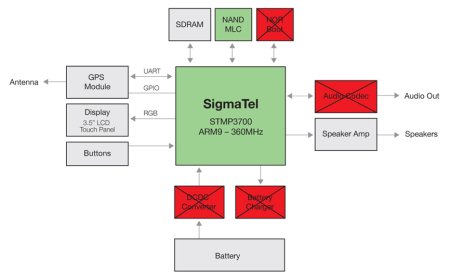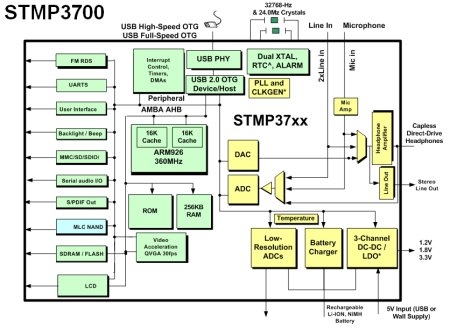SoC targets sub-$100 Linux-based GPS portables
Apr 21, 2008 — by Eric Brown — from the LinuxDevices Archive — 4 views Fabless audio chipmaker SigmaTel is shipping a highly integrated system-on-chip (SoC) for personal navigation devices (PNDs). Available with a Linux BSP and support from Embedded Alley, the ARM9-based STMP3738 reduces BOM costs 15 percent, and will ship in finished products by July, the companies said.
Fabless audio chipmaker SigmaTel is shipping a highly integrated system-on-chip (SoC) for personal navigation devices (PNDs). Available with a Linux BSP and support from Embedded Alley, the ARM9-based STMP3738 reduces BOM costs 15 percent, and will ship in finished products by July, the companies said.
(Click for larger view of the STMP3738 PND reference design)
The 90nm-fabricated STMP3700 family is based on a 360MHz ARM9 core. The SoC is said to replace up to a dozen discreet ICs found in typical PNDs, by integrating a NOR boot ROM, power management chip, battery charger, audio circuitry, and other analog and power management functions. That saves 15 percent on parts costs, and 30 percent on board real estate, while also enabling thinner designs, SigmaTel said.

STMP3738 reference design block diagram
(Crossed out boxes in red represent typical PND ICs
that are not needed with SigmaTel's SoC.)
(Click to enlarge)
The STMP3700 design does not incorporate the GPS itself, but it supports integration with GPS chips from Broadcom, SiRF, and NXP, says SigmaTel. It is also compatible with “all popular map application software and map databases,” says the company.

STMP3700 block diagram
(Click to enlarge)
SigmaTel is known for its mixed-signal ICs for the consumer electronics market, primarily audio codecs, which have been used in x86 Linux desktops shipped by Dell. In recent years its chipsets for MP3 players have comprised about 70 percent of revenues, estimated director of marketing Glenn Burchers, in an interview. The STMP3738 is based on the company's flagship 3700 processor, which has shipped in “millions” of MP3 devices, he said.
With their integrated audio, PNDs are a logical new market for the company, said Burchers. “The PND market is growing quickly, and 85 percent of volume is in the entry-level,” said Burchers. “Today, the most affordable PNDs cost about $150, but by the end of the year you'll see devices using the STMP3738 selling for under $100.”
According to Burchers, his devices will also reduce power consumption and help to extend battery life — a major problem with PNDs — but only up to a point. Burchers says that battery power on PNDs is primarily consumed by backlit displays.
SigmaTel is a member of the Silicon Vendor Partner Program (SVPP) recently introduced by Linux consulting and services company Embedded Alley (EA), which is supporting the STMP3738. The program offers customized software development kits (SDKs) that vendors can freely distribute, and includes mainline Linux kernel maintenance and regression testing.
In a statement, Embedded Alley CEO Pete Popov said, “With the investment made by SigmaTel, we can cost-effectively assist any customer using their silicon and expedite end product development.”
“Embedded Alley has been on time and on budget for us, and they have great engineers,” said Burchers. “We can support our large customers on our own just fine, but as you get down to the second and third tier, EA can do it more quickly and at a better cost. Each implementation is slightly different, and that's where their services really pay off.”
Availability
The STMP3738 is now shipping to SigmaTel's consumer electronics customers, says the company, with support for both Linux and Windows Embedded (Windows CE) 5 and 6. Pricing is set at $4.50 per SoC in 10K volumes shipped in a 169-pin BGA package, says the company.
This article was originally published on LinuxDevices.com and has been donated to the open source community by QuinStreet Inc. Please visit LinuxToday.com for up-to-date news and articles about Linux and open source.